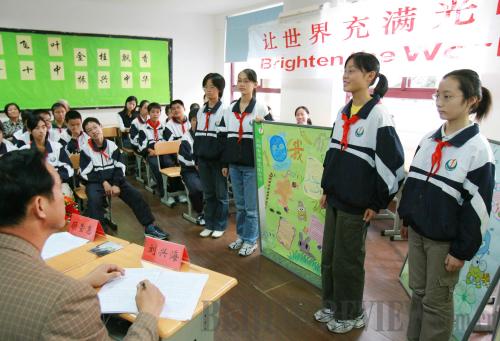|
 |
|
LEARNING LAW: Pupils of a middle school in Suzhou, Jiangsu Province, take part in a simulated hearing to learn about the legal system on October 30, 2006 (XINHUA) |
Currently, the second amendment to the Criminal Law has been included into the legislation agenda during the 12th Five-Year Plan (2011-15). It is widely believed that the principle of the "presumption of innocence" will be added to the amendment. Another example, the Regulations on Open Government Information of China took effect on May 1, 2008, advancing a transparent policy-making process within government and safeguarding citizens' right to know, which promotes people's participation in political affairs. The modification and amendment of laws and regulations is a complicated political process, which involved the change of political and juristic thoughts, as well as the adjustment of the relations between citizens and the government and among the judiciary departments of the government.
Third, China has reestablished law enforcement agencies since the late 1970s. It has improved the law enforcement system of public security, procuratorate and court, and has straightened out their relations to ensure that laws are enforced. The lawyer system has also been reestablished in China. After 1992, the status of lawyers has been transformed from government employees to individual professionals, which ensures that civil rights are better safeguarded.
The relations between state and society are the major content of a country's political system. Since the reform and opening up, the CPC and the Central Government have made constant reforms, and adjusted the relations between state and society, providing wider channels for people to express their opinions.
Along with the growth of the private sector in the national economy and the deepening strategic adjustment of state-owned enterprises, Chinese people are enjoying broader and freer choices in all aspects of their life, such as migrating, choosing residence, medical care, education, entertainment and consumption. With the emergence and growth of the private sector, Chinese citizens have shown greater interest in expressing and forming associations. Today, it is common for Chinese citizens to criticize the government's policies and officials' behavior. Chinese people have founded more than 300,000 non-governmental organizations (NGO) for various purposes including charity, mutual help, environmental protection, and safeguarding their various rights.
These NGOs have become an important platform for people to contribute their creativity to society, playing an active role in advancing people's livelihood and social undertakings. In addition, the Chinese Government is exploring and trying out new methods to administer NGOs.
In short, China's political reform has achieved great progress within the past 30 years since the implementation of the reform and opening up. The above three aspects summarize the political reform from the perspectives of the leadership structure and safeguarding civil rights.
Apart from these perspectives, there are some other perspectives to observe and study China's political reform. No matter whatever angles are approached, it can be concluded that China's political reform is continually moving forward.
However, the current political reform is still evolving, and there are many difficulties and problems in China's political system, which need to be adjusted according to the changes of domestic and international conditions.
The CPC is fully aware of this reality and will continue advancing China's political reform with an active attitude.
The author is a research fellow with the Central Compilation and Translation Bureau of China |
